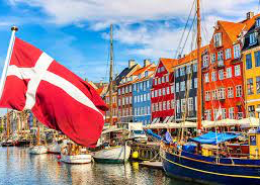Denmark operates within the Nordic model, which combines free market capitalism with generous social welfare programs, and it is one of the most popular international study destinations in Europe due to its low study costs, high-quality English-taught Master’s degrees, innovative teaching methods, great standard of living, and the large variety of study subjects available at Danish universities.
Here is everything you need to know about studying in Denmark as an international student.
1. Education system: Higher education in Denmark is free for all Bachelor’s and Master’s students coming from the EU/EEA area and Switzerland, as well as for students participating in an exchange program. For non-European citizens, tuition costs range between 6,000 and 16,000 EUR per academic year, depending on the program and university system. In Denmark, there are two types of degrees available, which are the Academy Profession degree and the Professional Bachelor’s degree. The Academy profession degree is a pre-Bachelor’s qualification obtained after 1 to 3 years of study, depending on the amount of European credits required, while the professional bachelor’s degree takes 3 to 4 years to complete, depending on the chosen program. There is also a diploma program, a master’s program, and a PhD program.
2. Housing: It is best to start researching housing options months before moving to Denmark so that you can compare different locations and prices and avoid making a bad decision. You will also not have to deal with the stress of not knowing where to live. For students who choose to live alone, you could get an apartment for 450 EUR/month. For students who would like to live with a colleague, you could get an apartment for 500 EUR/month, while a student hall of residence rent could cost 250–300 EUR/month.
3. Food Expense: On average, eating out in the city costs 30 EUR/person, and an average food expense could amount to 200–270 EUR/month depending on your spending and consumption level.
4. Cost of transportation: On the bus, metro, or train, you could spend up to 40–50 EUR/month. A high percentage of students in Denmark make use of bikes to get to their university, while some others make use of public transport.
5. Visa and residence permit fees: Students from European countries and Switzerland can stay in Denmark for 3 months without a permit, after which they can apply for a registration certificate at no cost. However, for non-European citizens, you would need a residence permit to study in Denmark, and the processing time takes around 2 months with a fee of 255 EUR.
6. Language and culture: A high percentage of Denmark’s population are ethnic Danes, who have a liberal and tolerant nature that welcomes all races and ethnicities. The most common language spoken is Danish. However, English is also very prominent as about 86% of Danes speak English as a second language. It is important to learn the Danish language because it would help you understand the way of life of the Danes and also give you a larger perspective on cross-cultural matters.
7. Application procedure: Entry requirements and procedures differ depending on the institution and program. For admission to a bachelor’s degree program, you will need certificates of prior educational qualifications with original stamps and signatures. For a Master’s degree, you are required to have a Bachelor’s degree that is relevant to your chosen subject matter and worth the same number of credits as a Danish degree. It is also important that applicants to undergraduate and postgraduate programs taught in English must prove their English proficiency using tests such as TOEFL, IELTS, and Cambridge ESOL (CAE).
In other words, to be able to study in Denmark as an international student, you must start by choosing a university that has programs aligned to your interests and plan of studies. Only then can you start on meeting the requirements and proceed to the application process.

